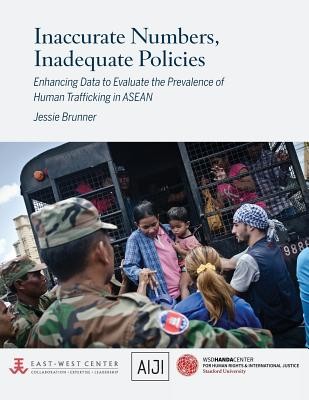
- We will send in 10–14 business days.
- Author: Jessie Brunner
- Publisher: East-West Center
- ISBN-10: 0866382682
- ISBN-13: 9780866382687
- Format: 21.6 x 28 x 0.4 cm, minkšti viršeliai
- Language: English
- SAVE -10% with code: EXTRA
Reviews
Description
It is impossible to know definitively the scale or scope of human trafficking. This unsettling uncertainty arises, in part, from the lack of robust, accurate, and standardized data related to human trafficking -- information that is critical to devising and implementing better policies to combat it. Policies and programs based on poor data will be equally poor in their effectiveness. The corrective impulse should focus not only on collecting more data, but better data. This data scarcity arises, in part, from the fact that those involved in human trafficking are inherently a hidden population. It is further challenged by insufficient institutionalization of the definition of human trafficking, corrupt practices linked to trafficking, and -- whether owing to a lack of resources or an unawareness of proper research methodologies -- the inability to properly gather and analyze such information. Though progress has been made, these challenges continue to confront ASEAN member states as they move later this year toward further economic consolidation and the adoption of the ASEAN Convention on Trafficking in Persons -- events that make regional collaboration and standardization on the issue of human trafficking all the more critical.
In support of this process, this report is intended as a resource for both ASEAN and the international anti-trafficking community in aiming to (1) establish a foundation of approaches to estimating hidden populations, (2) survey the field of current global and local prevalence measure methods, (3) outline normative and technical achievements and challenges that may guide future data collection and analysis in Southeast Asia, and (4) offer policy recommendations to advance understanding of the scale and scope of human trafficking.
- Author: Jessie Brunner
- Publisher: East-West Center
- ISBN-10: 0866382682
- ISBN-13: 9780866382687
- Format: 21.6 x 28 x 0.4 cm, minkšti viršeliai
- Language: English English
It is impossible to know definitively the scale or scope of human trafficking. This unsettling uncertainty arises, in part, from the lack of robust, accurate, and standardized data related to human trafficking -- information that is critical to devising and implementing better policies to combat it. Policies and programs based on poor data will be equally poor in their effectiveness. The corrective impulse should focus not only on collecting more data, but better data. This data scarcity arises, in part, from the fact that those involved in human trafficking are inherently a hidden population. It is further challenged by insufficient institutionalization of the definition of human trafficking, corrupt practices linked to trafficking, and -- whether owing to a lack of resources or an unawareness of proper research methodologies -- the inability to properly gather and analyze such information. Though progress has been made, these challenges continue to confront ASEAN member states as they move later this year toward further economic consolidation and the adoption of the ASEAN Convention on Trafficking in Persons -- events that make regional collaboration and standardization on the issue of human trafficking all the more critical.
In support of this process, this report is intended as a resource for both ASEAN and the international anti-trafficking community in aiming to (1) establish a foundation of approaches to estimating hidden populations, (2) survey the field of current global and local prevalence measure methods, (3) outline normative and technical achievements and challenges that may guide future data collection and analysis in Southeast Asia, and (4) offer policy recommendations to advance understanding of the scale and scope of human trafficking.


Reviews